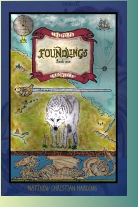
Foundlings by Matthew Christian Harding
Book 1 of the Peleg Chronicles
Zoe and Sozo Publishing (self-published), 256 pages
Genre: Christian tall tales for kids
This is a book written for conservative Christian homeschoolers by a homeschooling dad who loves to tell cliffhanging bedtime stories. It’s a fantasy story of sorts, with no magic. So actually I think it falls into Christian tall tales. It would be great to read aloud.
One main character is Lord McDougal, who despite his name is no Scotsman. Others have names that sound English, French, or various to me. The main city, Hradcanny, sounds eastern European to me. So, where and when are we?
The technology in the story is basically medieval: metal swords, some gunpowder, arrows with metal tips. The monsters are very large, very hungry beasts with no magical powers. There are vicious giants, too. All in all, the humans spend a fair amount of time avoiding being eaten. So, where and when are we?
This is not Middle Earth. It’s a young earth, at a time soon after the Flood and after the Tower of Babel when humans are starting to multiply, but “dragons” (dinosaurs) are still around. Against this backdrop, Harding spins his tale of two children, the foundlings. Lord McDougal, his assistant Fergus, and a dwarf are trying to rescue the children from dragon priests in a feudal society who want to sacrifice the children.
Harding’s tale, after the slow-start first chapter, is a page-turner. The main characters flee from peril into peril. We are left with cliff-hangers while the narrative switches to another group of characters. In fact, the book itself ends this way. Now we have to wait for the next book!
The characters are well-drawn, idiosyncratic, and consistent. McDougal has a lot of similarities to Don Quixote–he’s a nobleman, with an assistant, who is ridiculously awkward, on a quest with no particular aim in mind, who unintentionally picks a fight. Others laugh at him. Meanwhile, he is earnestly honest and gallant. No windmills, though. Only giants.
Those who follow Noah’s God seem to be a persecuted minority. All the main characters are followers of Noah’s God. When they get into difficulties, they pray for help, using verses from the King James Bible. This can make things a bit stiff–a newer translation would be better in my opinion. However, I welcome the use of the Bible in this way. The Word of the Lord is living and active, and why wouldn’t the Lord’s followers in earlier times have had some kind of access to it?
I am guessing that McDougal and his family eventually end up in Scotland; Thiery and his descendants eventually end up in France; Rosencross’s descendants eventually end up in England; and so on. That would make sense of the unusual ethnic mixture of names.
Bible-believing Christians will get a bang out of this book. It re-supposes early human history in a refreshing way, and spins a bundle of intertwined yarns that are entertaining and imaginative. Its heroes depend on the Lord for help. Unlike other fantasy works, this one contains no magic, no evolution, and no humanism. Conservative homeschooling families should take a good look at it.–Phyllis Wheeler
